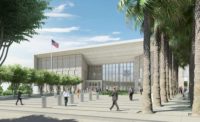Federal Buildings
State Dept. Awards Two Major Embassy Construction Contracts
House panel's Republicans criticize embassy-building bureau's 'Design Excellence' program

The U.S. ambassador to Sri Lanka, Atul Keshap (fourth from left), and other officials break ground on Dec. 5 for new embassy in Colombo.
Credit: Photo courtesy of U.S. Embassy in Sri Lanka
In a flurry of late-2016 activity, the State Dept. has awarded two embassy construction contracts and selected design firms for three other projects around the world. In addition, officials have broken ground for another new embassy, in Sri Lanka.
Caddell Construction Co., Montgomery, Ala., won the two major construction contracts, the State Dept.'s Bureau of Overseas Buildings Operations (OBO) announced on Dec. 6.
The larger of Caddell's two awards is a $203-million contract for a new multiple-building consulate-general complex in Hyderabad, India. Construction is to begin next year, with completion slated for 2020, the department said. Richard + bauer architecture, Phoenix, is the design architect, and Integrus Architecture, Spokane, Wash., is the architect of record for the design-build project.
Caddell also won a $194-million contract for a consulate-general complex in Dhahran, Saudi Arabia. The San Francisco office of Skidmore, Owings & Merrill LLP is the architect. This project is also slated for a 2020 completion, OBO said.
Also on Dec. 6, OBO announced it had chosen SHoP Architects, New York City, to design a new embassy project in Tegucigalpa, Honduras.
In addition, the department on Nov. 30 said it had picked Ennead Architects, New York City, to produce a design concept for a consulate-general project in Nogales, Mexico.
On Nov. 29, the State Dept. announced the selection of Seattle-based Miller Hull Partnership LLP to provide the design concept for a new U.S. embassy in Guatemala City, Guatemala.
On Dec. 5, the U.S. ambassador to Sri Lanka, Atul Keshap, along with other State Dept. and local officials, broke ground on a new U.S. embassy in Colombo. Caddell will build the complex. ZGF Architects LLP, Portland, Ore., is design architect, and Integrus is the architect of record.
The State Dept. reports that, in all, it has 53 projects under construction or in design.
Rod Ceasar, Caddell senior vice president-international, says that, as he looks at the embassy construction market in the next few years, “I see it as steady and don’t see it declining, really.”
The incoming Trump administration will set its own priorities for federal spending, including construction programs. But Ceasar does not foresee the new team implementing a major shift in embassy building.
He notes, “Even in the past, whether it’s a Democratic or a Republican administration, I really haven’t seen any change. The State Department’s needs and our diplomatic needs really stay fairly constant, regardless of the administration. I don’t see it changing under a new administration.”
The news about the projects comes at a time when House Republicans have criticized the State Dept. embassy program. GOP members of the Oversight and Government Reform Committee on Dec. 6 issued a draft staff report contending that the department has prioritized architectural quality over security and cost in its embassy projects.
According to a press release, the report also claims that the State Dept.'s "Design Excellence" effort, launched in 2011, has led to increased costs and longer construction schedules.
The report’s recommendations include having the State Dept. use standard embassy designs as the “default” for all new embassy facilities. During the George W. Bush administration, when retired Army Major General Charles Williams headed OBO, it embraced the use of standardized designs.
House committee Democrats strongly objected to the GOP draft staff report. Rep. Elijah Cummings (Md.), the panel’s ranking Democrat, said in a statement that the draft was “flawed and partisan” and “littered with unsubstantiated allegations, cherry-picked evidence and conclusions that contradict the overwhelming evidence that we obtained.”
Asked about the report in a Dec. 5 press briefing, State Dept. spokesman Mark Toner said, “The safety and security of U.S. personnel serving overseas is, obviously, at the forefront. It’s our top priority and the cornerstone of all the work that the bureaus of diplomatic security and overseas building operations do."
Toner added that, as of the date and time of the press briefing, State Dept. officials had been allowed only a limited review of the draft. He also said, “Certainly, we remain hopeful that the committee will revise its report based on some of the input and significant concerns that we’ve raised related to the accuracy and fairness and security sensitivities that were contained in the report.”
Further, he noted that the department had asked the House committee not to release the report before the panel submitted it for an interagency “security-sensitivity” review “to ensure that … the release of sensitive information in the report doesn’t compromise any of our people serving abroad or any of our facilities serving abroad."
Toner said, “Our Diplomatic Security Bureau and our Overseas Buildings Operations Bureau and our Management Bureau work hand in hand to ensure that safety is foremost—first and foremost—for Americans living overseas, and, also, of course, we look at the bottom line and what this costs the taxpayer.”
Asked about the timing of the State Dept.’s recent project announcements, a department spokesperson said via email, “OBO’s recent selection and award announcements are not in any way related to the release of the House Republican’s committee report.”
In another development, the Court of Federal Claims turned down Caddell’s protest of a State Dept. contract awarded to Framaco International Inc. to build an embassy project in Papua, New Guinea (ENR 11/23/16). Framaco’s final bid was $95.9 million.
The decision was filed on Nov. 17. Ceasar says Caddell doesn’t plan to appeal the court’s ruling.




